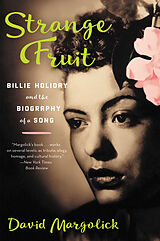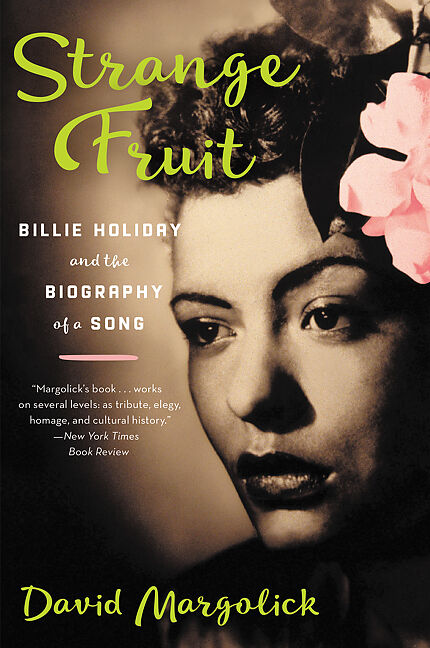Strange Fruit
Einband:
Kartonierter Einband
EAN:
9780060959562
Untertitel:
Billie Holiday and the Biography of a Song
Genre:
Kunst
Autor:
David Margolick
Herausgeber:
Harper Collins (US)
Anzahl Seiten:
168
Erscheinungsdatum:
23.01.2001
ISBN:
978-0-06-095956-2
Informationen zum Autor David Margolick is a contributor to Vanity Fair and the former National Legal Affairs Editor for the New York Times. A four-time Pulitzer Prize nominee, he is the author of Undue Influence and At the Bar. He lives in New York City. Klappentext Recorded by jazz legend Billie Holiday in 1939, "Strange Fruit" is considered to be the first significant song of the civil rights movement and the first direct musical assault upon racial lynchings in the South. Originally sung in New York's Cafe Society, these revolutionary lyrics take on a life of their own in this revealing account of the song and the struggle it personified. Strange Fruit not only chronicles the civil rights movement from the '30s on, it examines the lives of the beleaguered Billie Holiday and Abel Meeropol, the white Jewish schoolteacher and communist sympathizer who wrote the song that would have an impact on generations of fans, black and white, unknown and famous, including performers Lena Horne, Eartha Kitt, and Sting. Zusammenfassung Learn the story behind the song performed by Andra Day in "United States vs. Billie Holiday" now on Hulu Recorded by jazz legend Billie Holiday in 1939, Strange Fruit is considered the first significant song of the Civil Rights movement and the first direct assault against racial lynchings in the South. First sung in New York's Café Society, these revolutionary lyrics have taken up a life of their own, as David Margolick discusses in his revealing account of the song and the struggle it came to personify. Voted the Song of the Century" by Time, Strange Fruit is a searing evocation of lynching. And when Billie Holiday sang it, she held audiences in rapt attention, moving some to tears, others to anger, and all to a heightened awareness of the racist violence that was still, nearly a century after the Civil War, taking the lives of African Americans. Now, David Margolick's account cuts away the myths that have grown up around both Holiday and her most famous song, allowing readers to discover the true origins of Strange Fruit" and the circuitous paths it took to the center of a nation's conscience. Margolick establishes the political and cultural context that surrounded Strange Fruit in 1939a year in which there were three recorded lynchings and suspicion of many others, and which saw the publication of Gone with the Windand traces the song's journey through the red-baiting 50s and the incipient Civil Rights movement of the 60s, right up to the reverence it still inspires today. Along the way, Margolick includes commentary and reaction to the song from black and white audiences of different eras, and writers and musicians as varied as Lena Horne, Paul Robeson, Pauline Kael, Charles Mingus, Cassandra Wilson, Maya Angelou, among others. Exploring the intricate nexus between jazz, race, and politics, Strange Fruit opens a window onto an extraordinary song, the woman who sang it, and the role it played in our culture's evolving consciousness of racism. ...
Autorentext
David Margolick is a contributor to Vanity Fair and the former National Legal Affairs Editor for the New York Times. A four-time Pulitzer Prize nominee, he is the author of Undue Influence and At the Bar. He lives in New York City.
Klappentext
Recorded by jazz legend Billie Holiday in 1939, "Strange Fruit" is considered to be the first significant song of the civil rights movement and the first direct musical assault upon racial lynchings in the South. Originally sung in New York's Cafe Society, these revolutionary lyrics take on a life of their own in this revealing account of the song and the struggle it personified. Strange Fruit not only chronicles the civil rights movement from the '30s on, it examines the lives of the beleaguered Billie Holiday and Abel Meeropol, the white Jewish schoolteacher and communist sympathizer who wrote the song that would have an impact on generations of fans, black and white, unknown and famous, including performers Lena Horne, Eartha Kitt, and Sting.
Zusammenfassung
Learn the story behind the song performed by Andra Day in "United States vs. Billie Holiday" now on HuluRecorded by jazz legend Billie Holiday in 1939, “Strange Fruit” is considered the first significant song of the Civil Rights movement and the first direct assault against racial lynchings in the South. First sung in New York’s Café Society, these revolutionary lyrics have taken up a life of their own, as David Margolick discusses in his revealing account of the song and the struggle it came to personify.Voted the “Song of the Century"” by Time, “Strange Fruit” is a searing evocation of lynching. And when Billie Holiday sang it, she held audiences in rapt attention, moving some to tears, others to anger, and all to a heightened awareness of the racist violence that was still, nearly a century after the Civil War, taking the lives of African Americans. Now, David Margolick’s account cuts away the myths that have grown up around both Holiday and her most famous song, allowing readers to discover the true origins of “Strange Fruit"” and the circuitous paths it took to the center of a nation’s conscience.Margolick establishes the political and cultural context that surrounded “Strange Fruit” in 1939—a year in which there were three recorded lynchings and suspicion of many others, and which saw the publication of Gone with the Wind—and traces the song’s journey through the red-baiting 50s and the incipient Civil Rights movement of the 60s, right up to the reverence it still inspires today. Along the way, Margolick includes commentary and reaction to the song from black and white audiences of different eras, and writers and musicians as varied as Lena Horne, Paul Robeson, Pauline Kael, Charles Mingus, Cassandra Wilson, Maya Angelou, among others.Exploring the intricate nexus between jazz, race, and politics, Strange Fruit opens a window onto an extraordinary song, the woman who sang it, and the role it played in our culture’s evolving consciousness of racism.

Leider konnten wir für diesen Artikel keine Preise ermitteln ...
billigbuch.ch sucht jetzt für Sie die besten Angebote ...
Die aktuellen Verkaufspreise von 6 Onlineshops werden in Realtime abgefragt.
Sie können das gewünschte Produkt anschliessend direkt beim Anbieter Ihrer Wahl bestellen.
Loading...
Die aktuellen Verkaufspreise von 6 Onlineshops werden in Realtime abgefragt.
Sie können das gewünschte Produkt anschliessend direkt beim Anbieter Ihrer Wahl bestellen.
| # | Onlineshop | Preis CHF | Versand CHF | Total CHF | ||
|---|---|---|---|---|---|---|
| 1 | Seller | 0.00 | 0.00 | 0.00 |
